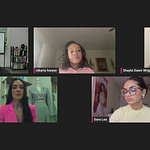Each week, I share no-fluff pageant coaching to help you lead, speak, and leave a legacy. With 300+ interviews and coaching across Miss Universe, Miss USA, and Miss America, this isn’t theory—it’s what works.
Writing This To You From Jackson Tennessee
When I told people I was flying halfway across the world to watch a pageant in Jackson, Tennessee, I got that look. You know the one. Equal parts confusion, mild concern, and “bless your heart.”
But I’ve done crazier things. And this time, there was method to the madness.
It all started with an interview I did with Haleigh Ryan Hurst—who, if you haven’t read her resume, could honestly run a small country. More than two minutes just to read the thing out loud. That’s how accomplished she is. So when someone like Haleigh gives her time and talent to a pageant system like Miss Volunteer America, my brain goes: “Right. What’s going on here?”
And then she mentioned Berkley. So I interviewed her too. Same vibe. Smart. Driven. Kind. Which is already a rare enough combo, but they were both speaking about the MVA system like it was a religious experience. That’s not normal. Not in pageantry.
Now, I’ve interviewed a lot of queens. I’ve heard all the standard lines. “My system is like a family.” “We’re all about empowering women.” Blah blah blah. And then behind the scenes, it’s The Hunger Games with fake tans.
But this was different.
What I saw in Jackson floored me. Girls treated like celebrities. Actual production value. The kind of stage where you don’t expect the curtain to fall on your head mid-performance. And most importantly? These girls felt valued. Not like filler. Not like ATM machines with heels. Valued.
You can’t fake that.
I’ve said before that there are generally two kinds of systems: the glamorous ones (where your measurements flash up like you’re livestock at auction) and the scholarship ones (where talent, education and actual impact matter). MVA somehow blends both (minus the livestock).
These women aren’t just walking Barbies. They’re intelligent, articulate, purpose-driven—and yes, still glamorous AF. They’re out there doing the work, whether it’s volunteering with St. Jude’s or performing opera like their lives depend on it. (Shoutout to Grace Herdelin for giving me literal goosebumps.)
And the directors? They actually care. One of them said to me, “We want to make our girls feel valued.” I could’ve cried. Because that’s the difference. That’s the unique selling point. Not the crowns or the photo shoots. Not even the scholarships—though debt-free education is an absolutely amazing perk.
The difference is how they’re treated.
So here’s the takeaway, whether you're a contestant or a director: fun is fleeting. Value lasts. Treat your girls like they matter, and they’ll walk away fulfilled, even if they don’t win. Hell, they might come back and do it all over again.
I came to Jackson for research. I left with a reminder of what pageantry can be when it’s done right.
And yes, I’m already planning next year’s trip.
Timestamps
0:01 Arrival in Jackson for MVA pageant
2:16 First impressions of Haleigh and Berkeley – why their endorsements matter
3:34 Glamour vs. scholarship systems – contrasting priorities
6:42 Why scholarship-based systems matter – debt-free education
10:05 Community involvement and celebrity treatment of contestants
12:08 Core takeaway: making contestants feel valued
14:57 Partnerships with charities – meaningful engagement
17:32 Talent segment highlights – value of genuine performance
If you're looking for personalised coaching, I offer a limited number of private sessions. It’s for women who want tailored strategy, mindset support, and real accountability—on stage and beyond.
Pageantry is evolving—and you deserve coaching that’s more than surface-level. Join us if you're ready to go beyond the crown.








